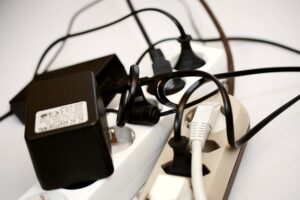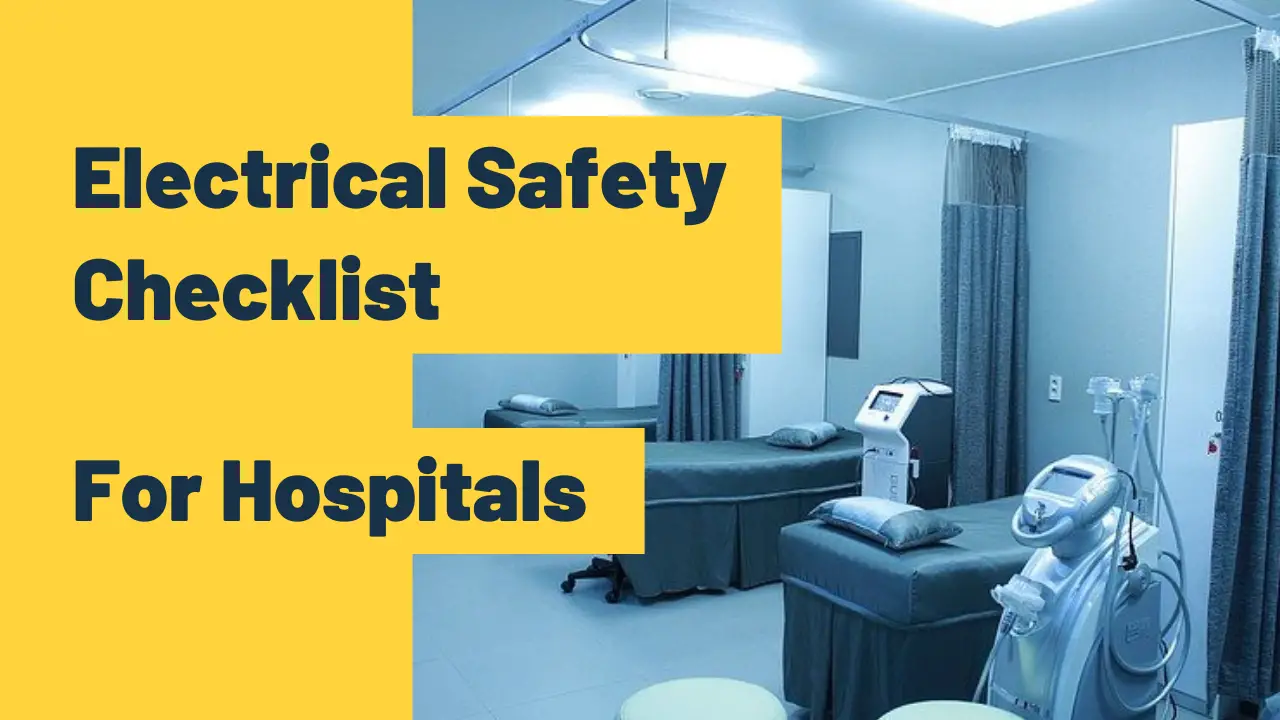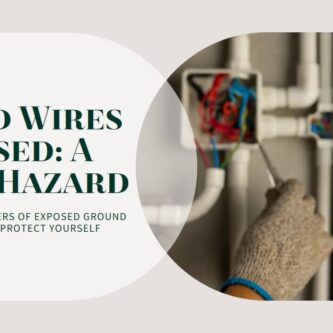Why is the Electrical Safety Checklist Important?
The electrical Safety checklist for Hospitals is a series of standard regulation procedures to ensure the safety of healthcare workers as well as patient in the hospitals.
Electrical safety in hospitals is one of the important issues. Because most of the devices or other appliances used in the hospitals are electricity-based.
And a small issue or miss care can cause a big problem for both patients and healthcare workers.
Due to its prime importance, different international standards are in use for ensuring electrical safety in hospitals.
why is electrical safety in hospitals difficult?
Electrical safety in hospitals is difficult because hospitals receive many visitors and patients, in addition to a great diversity of staff, there are nurses, doctors, cleaners, and other service workers.
Hospitals also receive workers, from outside the hospital, to maintain various devices and systems such as water, oxygen, air conditioning, and heating systems.
All this makes the process of maintaining electrical safety a difficult task, as we cannot qualify and train all these people.
We will not be able to verify that they maintain electrical safety rules while they are inside the hospital.
Besides, almost all devices in the hospitals depend on electrical energy, which makes electricity exit almost in all locations at the hospitals, and does its hazard.
One more thing is the criticality of the place and its safety makes electrical safety in hospitals hard but a must.
Electrical hazards in hospitals

Electrical energy hazards exist almost everywhere! this is because electricity is the big player when it comes to equipment and devices operation. Of course, healthcare devices depend on electrical energy.
The electrical danger in hospitals is not the same as the hazard at homes and construction sites. Yep, it has common stuff.
I’ve written a detailed article about Electrical Safety At Construction sites. Read it for more information.
Let’s see what is an electrical hazard in hospitals:
- Damaged insulation. Cords and cable insulation should be in a good condition all the time. Any damage or cracked insulation parts can cause electrical shock or even a short circuit.
- Power outage. This is one of the highest electrical hazard risks in hospitals. Power outage is not permitted in hospitals. It’s essential to provide an emergency power source independent of the national grid.
- Electrical power surge. Medical devices are sensitive to electricity, any surges can cause the devices to get damaged. A good protection program can help very well prevent this hazard.
- Low visibility due to poor lighting. Healthcare workers need powerful lighting. Good lighting helps them do their tasks easy and perfectly.
- Rusty electrical panels. Electrical danger starts from the incoming panels. Rust can cause bad openings and even can cause a short circuit if rust makes a contact between phase and neutral.
- Poor grounding. All metallic parts which have electrical power near them should be grounded.
- Poor maintenance program for electrical devices. Poor maintenance can cause electrical faults and cause the device to stop or give wrong measurements about patient status. Take into account that many healthcare devices require periodic calibration.
- Absence of an emergency plan for any related electrical emergency situation. A powerful emergency plan can save lives. Everyone should know what he should do exactly and train on this regularly.
- Overloaded outlets can cause electrical fire due to temperature rise. Overloaded circuits generate heat.
Standards that organize electrical safety in hospitals
Some common international standards are IEC 60601 AAMI / NFPA99, IEEE – Electric systems in healthcare facilities, and much more.
Every country has its own standards but they have to comply with International Organization for Standardization (ISO) and the International Electro-technical Commission (IEC) regulations.
Electrical safety is important, Now let’s discuss a complete Electrical Safety checklist for hospitals.
Electrical Safety Checklist for hospitals
Your electrical checklist should contain complete data about the safety inspection performer, date, and location to be inspected.
And all the inspection data and notes should be recorded. The below items also are important.
Checklist
The first thing to do is to wear your health care proper PPE. Contact the hospital authority and make sure they are aware of which area the inspection will run.
- Check the emergency power source. Make sure it’s ready to start automatically. Test it, and record its response time.
- If the hospital uses an emergency electrical generator, ensure its preventive maintenance is done per manufacturer recommendations.
- Critical devices that require a power source all the time should have a UPS able to run them in case of a power outage till the emergency power source work.
- Make sure that all electrical and metallic parts are well grounded. Check the latest records of the ground resistance measurement.
- Check the grounding conductor condition. make sure it is insulated copper.
- Ensure each patient bed has two separate power sources. One is from the normal source and the other is from the emergency source.
- Check the number of receptacles beside all patient beds, Check if the number is enough for electrical medical devices.
- Each critical care space beside the patient bed should have at least one or more receptacles from the emergency source.
- Ensure using ground fault circuit interrupter (GFCI) in wet locations.
- Ambulance parking should have power receptacles to charge any chargeable devices in the ambulance.
- Check lighting distribution at all paces and make sure it is enough.
- Ensure that all lighting fixtures are working and have regular maintenance program.
- Ensure that loads are not exceeding the design of the electrical system.
- Emergency lighting fixtures should be well distributed in the location. Test these lighting fixtures.
For more information about Safety Audit and How To Conduct It? read my article here.
After the above electrical safety checklist for hospitals, let’s mention some detailed tips to keep in mind when making an electrical safety inspection.
Electrical Equipment in Hospitals
Different types of equipment are in use during daily routine in hospitals. And a lot of people perform their job.
Most of them are unaware of the related hazards. For safety purposes listing electrical devices used in hospitals and how to use them in a safe way is necessary.
Let’s take an example. GENERATORS are important devices to provide power backup in case of power failure.
The generator needs to be operated in an open area. While if we use it in close space, It will add up carbon monoxide and as a result, it produces harmful effects on human health.
Besides this proper ventilation and extreme care is needed during refueling and handling.
Electrocution
Different types of Electrical devices are used in hospitals. While the usage of these devices is directly connected with patients and healthcare workers.
To avoid electrocution both patients and healthcare workers must follow safety tips. For example, operation theaters and ICUs need to be connected with isolation transformers.
It is another important tip for an electrical safety checklist for hospitals. Through isolation transformers, we can easily connect different medical equipment to an AC power source.
These isolation transformers protect patients and staff coming in contact with the equipment from electric shock.
Similarly, rubber mats with a first-aid kit and a neat LT Panel are also recommended to avoid electrocution.
Fire hazards due to Electrical installations in Hospitals
In the previous article, we worked on fire hazards at different types of workplaces. However, fire hazards in hospitals are riskier.
As in workplaces workers have enough training, PPE, and other techniques to deal with fire situations.
However, patients in hospitals need care for their daily tasks, And they cannot protect themselves during a fire.
It is important to completely eliminate and reduce electrical hazards that cause a fire.
- Don’t use electrical cords or extensions for heavy equipment and a long time.
- Make sure safety devices like breakers, and fuses work properly.
- Install fire alarms, heat sensors, and smoke detectors properly.
- Protective devices like fuse and circuit breakers are considered necessary in the electrical Safety checklist for hospitals.
How to Monitor electrical system
A good electrical device condition ensures its safe to use. To continuously check the status of electrical equipment in the hospital proper monitoring system is required.
A building management system or computer-based control system needs to be installed, in order to monitor electrical equipment.
Using this system you can have a constant check on tripping, sparking, and other electrical hazards. You can use a CCTV system also.
This is a type of remote monitoring and is one of the important electrical Safety checklists for Hospitals.
electrical safety rules in hospitals
Electrical safety rules in hospitals should be clear for all workers. Following these safety rules is mandatory and should be a high-importance matter.
- Never overload power outlets.
- Never ever use electrical devices when it’s wet or when your hands are wet.
- Only authorized electricians are allowed to repair any electrical devices. Never try if you are not an electrician.
- Electricians must be aware about what they should an shouldn’t wear. I have written a detailed article about What electricians should and shouldn’t wear, read it for more information.
- Don’t hold electrical devices by its cord.
- Pull the plug of any device, not the cord.
- Never break off the grounding prong of power plugs.
- Extension cords are allowed only for temporary use and away from people’s paths.
- Plug off any unused device, if it’s allowed to be switched off. Note that some devices are 24/7 working.
you work With Electricity! Don’t leave empty-handed!
Looking to stay ahead of the game in the world of electrical engineering? Subscribe to my YouTube channel and gain access to exclusive content you won’t find anywhere else!
The staff I recommend (Amazon Affiliate Links to products I believe are high quality):
- Economy 120 Volt/60Hz AC Power Source – Step-Down Voltage & Frequency Converters 1800W
- UNI-T Digital Multimeter Tester UT139C
- 50-Amp Extension Cord for RV “100ft”
- Voltage Stabilizer 110/220v
- Hair Dryer “best selling“
- TOSHIBA EM131A5C-BS Countertop Microwave Ovens
Disclaimer: This contains affiliate links to Amazon products. I may earn a commission for purchases made through these links.


